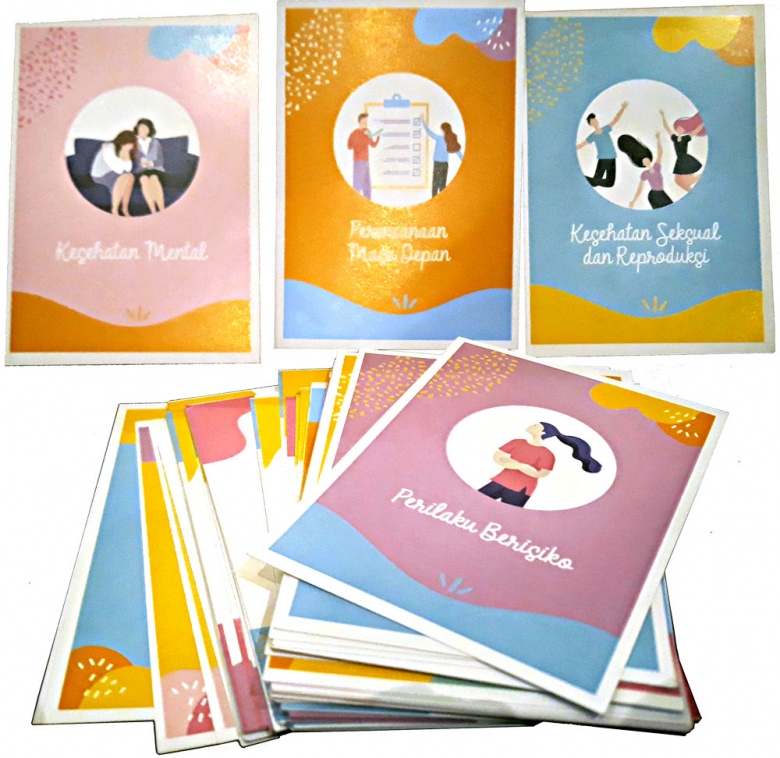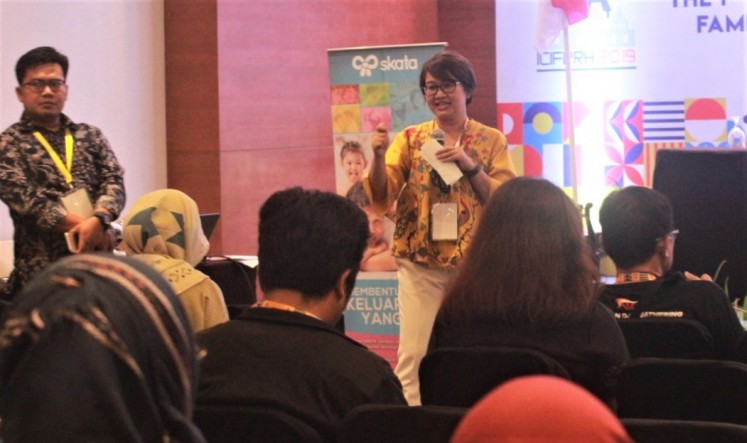Popular Reads
Top Results
Can't find what you're looking for?
View all search resultsPopular Reads
Top Results
Can't find what you're looking for?
View all search results‘1001 Ways of Talking’: Campaign aims to bring parents, teens closer
The teen years may, if not handled right, turn into a period of conflict between parents and children. A new campaign aims to bring them together.
Change text size
Gift Premium Articles
to Anyone
Being parents of adolescents is not easy and Asep Sopari knows this firsthand.
He has long wanted to ask his 11-year-old son whether he had experienced his first wet dream – common in puberty due to hormonal changes -- but the subject is shrouded in myth rather than fact, which makes discussing it sensitive.
“I haven’t been able to ask him that until now. [I’ve been wondering] how to frame the question. And what if my son has more questions? Would I be ready with the answers? Working with teens comes with the job,” said the subdivision head of the National Family Planning Board (BKKBN)’s Directorate of Youth Resilience Development.
“What happens with uneducated parents or those who are uninformed on reproductive health?”
He was speaking to the media when unveiling a plan to launch a new program, called “1001 Cara Bicara” or 1001 ways of talking, which is aimed at returning the role of parents as first reference of their children on sexual and reproductive health education, at the first International Conference on Indonesian Family Planning and Reproductive Health in Yogyakarta.
The campaign will be officially launched on Oct. 24 in Jakarta by SKATA, a parenting site that offers information on sexual and reproductive health. The site, set up in 2015, is supported by the Johns Hopkins Center for Communication Program (JHCCP) and the BKKBN.
Lack of information on reproductive health among teens is one of the aspects blamed for teen pregnancy and marriage in Indonesia.
The Health Ministry’s 2018 Basic Health Research (Riskesdas) found that 33.5 percent of girls aged 15 to19 fell pregnant, while the 2016 National Social and Economic Survey (Susenas) revealed that one out of nine girls under the age of 18 was married, with 0.5 percent of them being below the age of 15.
This is not surprising considering that teenagers have become permissive toward premarital sex, while only five out of 10 realize that a girl can fall pregnant the first time she has sex.
A number of aspects are said to be behind the lack of knowledge, such as parents considering it taboo to talk about sexual and reproductive health, even though they should play an important role in delivering accurate information and in motivating and being role models for their children.
“Parents are very enthusiastic to learn about parenting when their children are little, but then stop as they grow older. When their children grow up and become adolescents, the challenges confuse them,” said Dinar Pandan Sari, JHCCP’s demand generation officer.
These days, she said, teens look upon their friends and Google as their best friends, with some thinking their parents do not have all the answers for their curious minds or they may get scolded or lectured when asking questions. Parents lose control in the process.
SKATA aims to return the role to parents as the first reference on sexual and reproductive health for their children through the campaign.
“’1001 Cara Bicara’ is designed as a program that may seem simple, but it will have a great impact in the future,” Dinar said.
{gal:2]
The campaign – which comprises an e-book, brief video tips and other various products like journals and flashcards – is expected to inspire parents to find the right way to communicate with their teenage children. All will be accessible online.
The book is based on international technical guidelines on sexual and reproductive health and touches on various issues, starting from their daily routine to gadget habits, while the cards aim to stimulate discussions on various issues between parents and children.
The journals, she said, are for the parents to write down their experiences when they were young – like when the mother first met the father or the first time they skipped school.
“The parents can then give the journals to their children to read, sharing their own life experiences, to help their children relate to them,” Dinar says.
The campaign has two goals, she said, the first to build closeness, making parents approachable, and second to gain the trust of their children. “The book’s content will also help parents explain when their children want to know, for instance, about their period, why they experience mood swings or start to like someone,” Dinar said.
The campaign, she said, will also be interconnected with the DokterGenZ site, which offers information on sexual and reproductive health issues for teenagers. “This way parents can view what their teen’s experience.”












